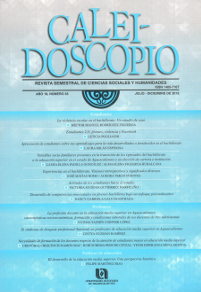Development of emotional competencies in high school students through a psychoeducational approach
DOI:
https://doi.org/10.33064/33crscsh563Keywords:
emotional competencies, awareness of self and emotional self-regulation, Gestalt psychotherapy, emotional educationAbstract
According to the Integral Higher Average Education (RIEMS) reform, educating competence require educators to rethink educational purposes and modify the established knowledge to include others that make more sense and serve for the life of the student. This involves thinking about the emotional education as an innovative alternative to the development of emotional competence affecting the welfare of the learner. This work shows a prior study carried out in the Centre of Secondary Education of the uaa which sought to develop two emotional competencies: the consciousness of self and emotional self-regulation in a group of 40 sixth-semester students who took the elective course of Humanistic Psychology in the year 2013. It was applied a psychoeducational treatment under the light of the principles and tenets of the Gestalt psychotherapy and emotional education, with a measurement test-retest, using the scale tmms - 24, a questionnaire specifically built to measure awareness of self, as well as auto reports from students about their learning experiences. The results showed a statistically significant increase in the domain of these emotional competencies; these, contrasted with other studies, allowed to affirm that the intervention was successful to encourage these skills, resulting in an improvement of the participants adaptation to their environment, recognizing an impact on the emotional autonomy and other skills for life and well-being which were not directly worked during the intervention.Downloads
Downloads
Published
How to Cite
Issue
Section
License
Licencia Creative Commons Atribución-NoComercial-CompartirIgual 4.0 Internacional
El lector es libre de compartir o adaptar el material en cualquier medio o formato bajo las condiciones siguientes: (a) debe reconocer adecuadamente la autoría, proporcionar un enlace a la licencia e indicar si se han realizado cambios; (b) no puede utilizar el material para una finalidad comercial y (c) si remezcla, transforma o crea a partir del material, deberá difundir sus contribuciones bajo la misma licencia que el original.
Resumen de la licencia
https://creativecommons.org/licenses/by-nc-sa/4.0/deed.es_ES
Texto completo de la licencia
https://creativecommons.org/licenses/by-nc-sa/4.0/legalcode
Cada autor es responsable del contenido de su artículo. En el caso de un texto colectivo, el primer autor asume la responsabilidad intelectual de los resultados del proceso editorial; los autores son responsables de obtener la licencia de autor para reproducir materiales gráficos o fotográficos que pertenecen a terceros.
Los autores asumen plena responsabilidad en el caso de falsificación de datos o falta de autenticidad en la investigación. Se comprometen, también, a no reutilizar trabajos ya publicados, total o parcialmente, para presentarlos en otra publicación.
Estas condiciones aplican tanto a la versión impresa como a la versión electrónica de la revista.


















